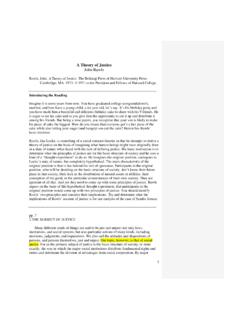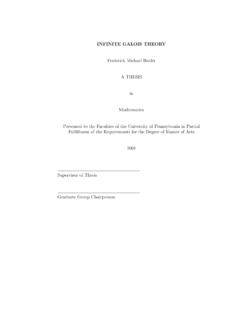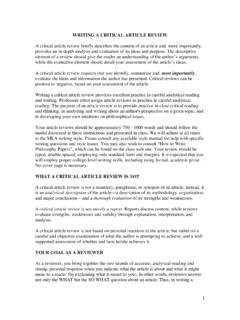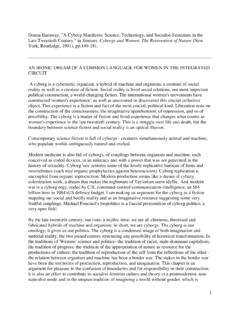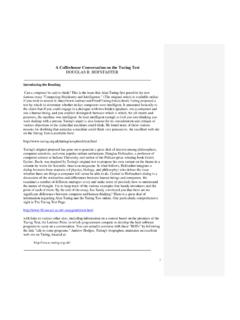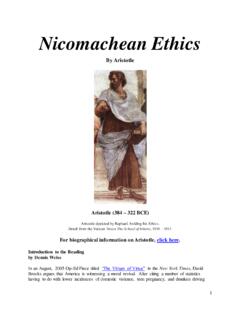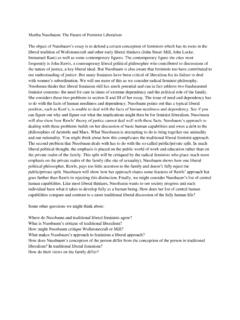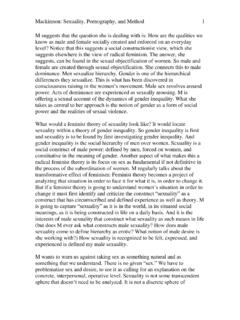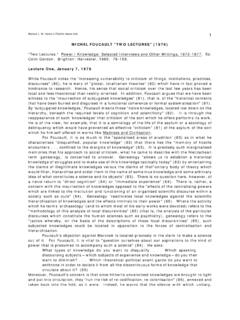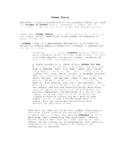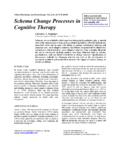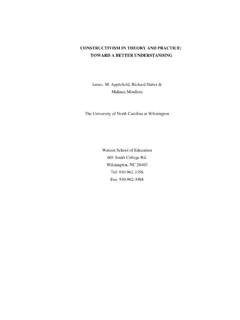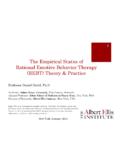Transcription of Theory, Feminism, and Feminist Theory
1 1 Theory , feminism , and Feminist Theory As we begin to consider Feminist Theory , we must examine a number of important and central issues, including: What is Theory ? What does it mean to theorize? What is specifically Feminist about Feminist Theory ? Are there specific methods for Feminist theorizing? What is the relation of Theory to everyday experience and practice? What are the implications of the diversity of Feminist theories? The editors of Feminist Frameworks suggest the following regarding Theory : A Theory offers a general account of how a range of phenomena are systematically connected; by placing individual items in a larger context, it increases our understanding both of the whole and of the parts constituting the whole.
2 Theory is a systematic, analytic approach to everyday Feminist Theory , they suggest, attempts to develop a comprehensive account of the subordination of women, including its supposes essence and origin; is a prerequisite for developing effective strategies to liberate women; identifies the underlying causes of women s subordination. Rosemarie Tong suggests that Feminist Theory attempts to describe women s oppression, to explain its causes and consequences, and to prescribe strategies for women s liberation. In Women Do Theory , Jane Flax suggests that Theory is a systematic, analytic approach to everyday experience. Flax argues that everybody does this unconsciously and that to theorize is to bring this unconscious process to a conscious level so that it can be developed and refined.
3 As Flax explains: All of operate on theories, though most of them are implicit. We screen out certain things; we allow others to affect us; we make choices and we don t always understand why. Implicit Theory -making includes our assumpt ions about the way the world works. Theory makes those choices conscious, and enables us to use them more efficiently. According to Flax, Feminist Theory has several purposes: 1. to understand the power differential between men and women 2. to understand women s oppression how it evolved, how it changes over time, how it is related to other forms of oppression 3. how to overcome oppression 2 Flax suggests that Feminist Theory is intimately related to action: Feminist Theory is the foundation of action and there is no pretense that Theory can be neutral.
4 Within Feminist Theory is a commitment to change oppressive structures and to connect abstract ideas with concrete problems for political action. There has to be a commitment to do something about the situation of wo men. Marilyn Frye addresses the theme of Feminist Theory in her essay The Possibility of Feminist Theory , where she notes that the dominant approach to Theory in Western philosophy has focused on generalization: enumerative, statist ical, and metaphy sical generalization, none of which is kind to particulars. Metaphysical generalization especially, she notes, declares this or that to be the what-it-is of a thing, threatening the annihilation of that which does not fit its prescription.
5 Frye seems suspicious of humanism and speaking as a human being for this reason. But you have to have some sort of genuinely general generality to have Theory . Our project is theoretical, philosophical, political. You have to have some sort of genuinely general generality to have Theory , philosophy, politics. feminism , Frye observes, has been going at generality in another way from the start. Frye argues that the generalizing movement of Feminist was not toward metaphysical, statistical, or universal generalization. She connects Feminist generalizing to hearing each other into speech. The experiences of each woman and of the women collectively generate a new web of meaning.
6 As she notes, Our process has been one of discovering, recognizing, and creating patterns patterns within which experience made a new kind of sense. Instead of bringing a phase of enquiry to closure by summing up what is known, as other ways of generalizing do, pattern recognition/construction opens fields of meaning and generates new interpretive possibilities. Instead of drawing conclusions from observations, it generates observations. Her Feminist method is recognizing and naming patterns, identifying schemas. She mentions, for instance, the pattern of male dominance in conversations. Naming patterns is not reductive or totalitarian. What we do is sketch a schema within which certain meanings are sustained.
7 In Tapestries of Life, Bettina Aptheker recommends a bottom-up approach, a search for the meanings that can be found in the daily activities of women s lives. Discovering and connecting these meanings, she contends, will help feminists develop what she calls a map of women s reality from women s point of view, a view that she refers to a women s standpoint. Aptheker argues that women s lives are fragmented, dispersed, episodic. They are often determined by events outside of women s control. She focuses on the dailiness of women s lives: the patterns women create and the meanings women inve nt each day and over time as a result of their labors and in the context of their subordinated status to men.
8 The point is to suggest a way of knowing from the meanings women give to their labors. As Aptheker writes, The search for dailiness is a method of work that allows us to take the patterns women create and the meanings women invent and learn from them. If we map out what we learn, connecting one meaning or inve ntion to another, we begin to lay out a different way of seeing reality. This way of seeing is what I refer to as women s 3 standpo int. This standpoint pivots depending upon the class, cultural, or racial locations of its subjects, and upon their age, sexual preference, physical abilities, the nature of their work and personal relationships. What is proposed is a mapping of that which has been traditionally erased or hidden.
9 In this mapping Aptheker pays particular attention to stories, as it is from stories that we learn about the reality of women s lives, about the suffering, the failure, the struggle to nurture well. Cultures shape stories in different ways, and stories pass on women s consciousness as it has been shaped by specific cultural, racial, and class experience. Wo men s stories locate women s cultures, women s ways of seeing; they designate meaning, make women s consciousness visible to us. Stories transform our experiences into ways of knowing about ourselves as women and about ourselves as women looking at the world. A women s standpoint emerges from scenes and stories suggesting ideas, feelings, and sensibilities about the nature of beauty, about personal and social change, about the conditions necessary for life and growth, about the importance of interpersonal communication and friendship.
10 These ideas, and certainly the feeling of dailiness from which they emanate, contrast sharply with those of the dominant culture. Aptheker s article suggests the manner in which we can theorize about women s lives from the standpo int of their dailiness. Beginning with the stories women tell and the dailiness of their lives, Aptheker constructs a systematic and coherent account of women s lives. Some representative accounts of Feminist Theory : Charlotte Bunch: feminism and Education: Not By Degrees Theory enables us to see immediate needs in terms of long-range goals and an overall perspective on the world. It thus gives us a framework for evaluating various strategies in both the long and the short run and for seeing the types of changes that they are likely to produce.
